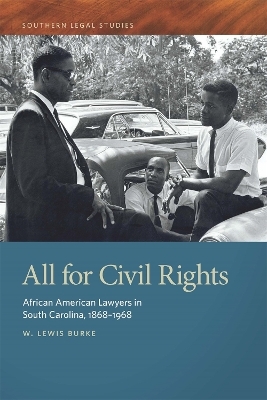
All for Civil Rights
African American Lawyers in South Carolina, 1868–1968
Seiten
2019
University of Georgia Press (Verlag)
978-0-8203-5679-2 (ISBN)
University of Georgia Press (Verlag)
978-0-8203-5679-2 (ISBN)
Beginning in Reconstruction and continuing to the modern civil rights era, 168 black lawyers were admitted to the South Carolina bar. All for Civil Rights is the first book-length study devoted to those lawyers' struggles and achievements in the state that had the largest black population in the country, by percentage, until 1930.
The history of the black lawyer in South Carolina," writes W. Lewis Burke, "is one of the most significant untold stories of the long and troubled struggle for equal rights in the state." Beginning in Reconstruction and continuing to the modern civil rights era, 168 black lawyers were admitted to the South Carolina bar. All for Civil Rights is the first book-length study devoted to those lawyers’ struggles and achievements in the state that had the largest black population in the country, by percentage, until 1930—and that was a majority black state through 1920.
Examining court processes, trials, and life stories of the lawyers, Burke offers a comprehensive analysis of black lawyers’ engagement with the legal system. Some of that study is set in the courts and legislative halls, for the South Carolina bar once had the highest percentage of black lawyers of any southern state, and South Carolina was one of only two states to ever have a black majority legislature. However, Burke also tells who these lawyers were (some were former slaves, while others had backgrounds in the church, the military, or journalism); where they came from (nonnatives came from as close as Georgia and as far away as Barbados); and how they were educated, largely through apprenticeship.
Burke argues forcefully that from the earliest days after the Civil War to the heyday of the modern civil rights movement, the story of the black lawyer in South Carolina is the story of the civil rights lawyer in the Deep South. Although All for Civil Rights focuses specifically on South Carolinians, its argument about the legal shift in black personhood from the slave era to the 1960s resonates throughout the South.
The history of the black lawyer in South Carolina," writes W. Lewis Burke, "is one of the most significant untold stories of the long and troubled struggle for equal rights in the state." Beginning in Reconstruction and continuing to the modern civil rights era, 168 black lawyers were admitted to the South Carolina bar. All for Civil Rights is the first book-length study devoted to those lawyers’ struggles and achievements in the state that had the largest black population in the country, by percentage, until 1930—and that was a majority black state through 1920.
Examining court processes, trials, and life stories of the lawyers, Burke offers a comprehensive analysis of black lawyers’ engagement with the legal system. Some of that study is set in the courts and legislative halls, for the South Carolina bar once had the highest percentage of black lawyers of any southern state, and South Carolina was one of only two states to ever have a black majority legislature. However, Burke also tells who these lawyers were (some were former slaves, while others had backgrounds in the church, the military, or journalism); where they came from (nonnatives came from as close as Georgia and as far away as Barbados); and how they were educated, largely through apprenticeship.
Burke argues forcefully that from the earliest days after the Civil War to the heyday of the modern civil rights movement, the story of the black lawyer in South Carolina is the story of the civil rights lawyer in the Deep South. Although All for Civil Rights focuses specifically on South Carolinians, its argument about the legal shift in black personhood from the slave era to the 1960s resonates throughout the South.
W. Lewis Burke is Distinguished Professor Emeritus of the University of South Carolina School of Law. His books include At Freedom’s Door: African American Founding Fathers and Lawyers in Reconstruction South Carolina. Timothy S. Huebner, an associate professor of history at Rhodes College, is author of The Taney Court: Justices, Rulings, and Legacy and coeditor, with Kermit L. Hall, of Major Problems in American Constitutional History, second edition. He and Paul Finkelman edit the series Studies in the Legal History of the South.
| Erscheinungsdatum | 17.10.2019 |
|---|---|
| Reihe/Serie | Southern Legal Studies Series |
| Mitarbeit |
Herausgeber (Serie): Paul Finkelman, Timothy S. Huebner |
| Zusatzinfo | 13 black & white images |
| Verlagsort | Georgia |
| Sprache | englisch |
| Maße | 152 x 229 mm |
| Gewicht | 535 g |
| Themenwelt | Geschichte ► Teilgebiete der Geschichte ► Militärgeschichte |
| Recht / Steuern ► Rechtsgeschichte | |
| Sozialwissenschaften ► Ethnologie | |
| Sozialwissenschaften ► Politik / Verwaltung | |
| Sozialwissenschaften ► Soziologie | |
| ISBN-10 | 0-8203-5679-4 / 0820356794 |
| ISBN-13 | 978-0-8203-5679-2 / 9780820356792 |
| Zustand | Neuware |
| Haben Sie eine Frage zum Produkt? |
Mehr entdecken
aus dem Bereich
aus dem Bereich
neueste Manipulationstechniken als Waffengattung der NATO
Buch | Softcover (2023)
Westend (Verlag)
24,00 €
Deutschlands Schwäche in der Zeitenwende
Buch | Softcover (2023)
C.H.Beck (Verlag)
18,00 €


